Sparkling Coils, Cooler Home: A Guide to AC Cleaning


Sparkling Coils, Cooler Home: A Guide to AC Cleaning
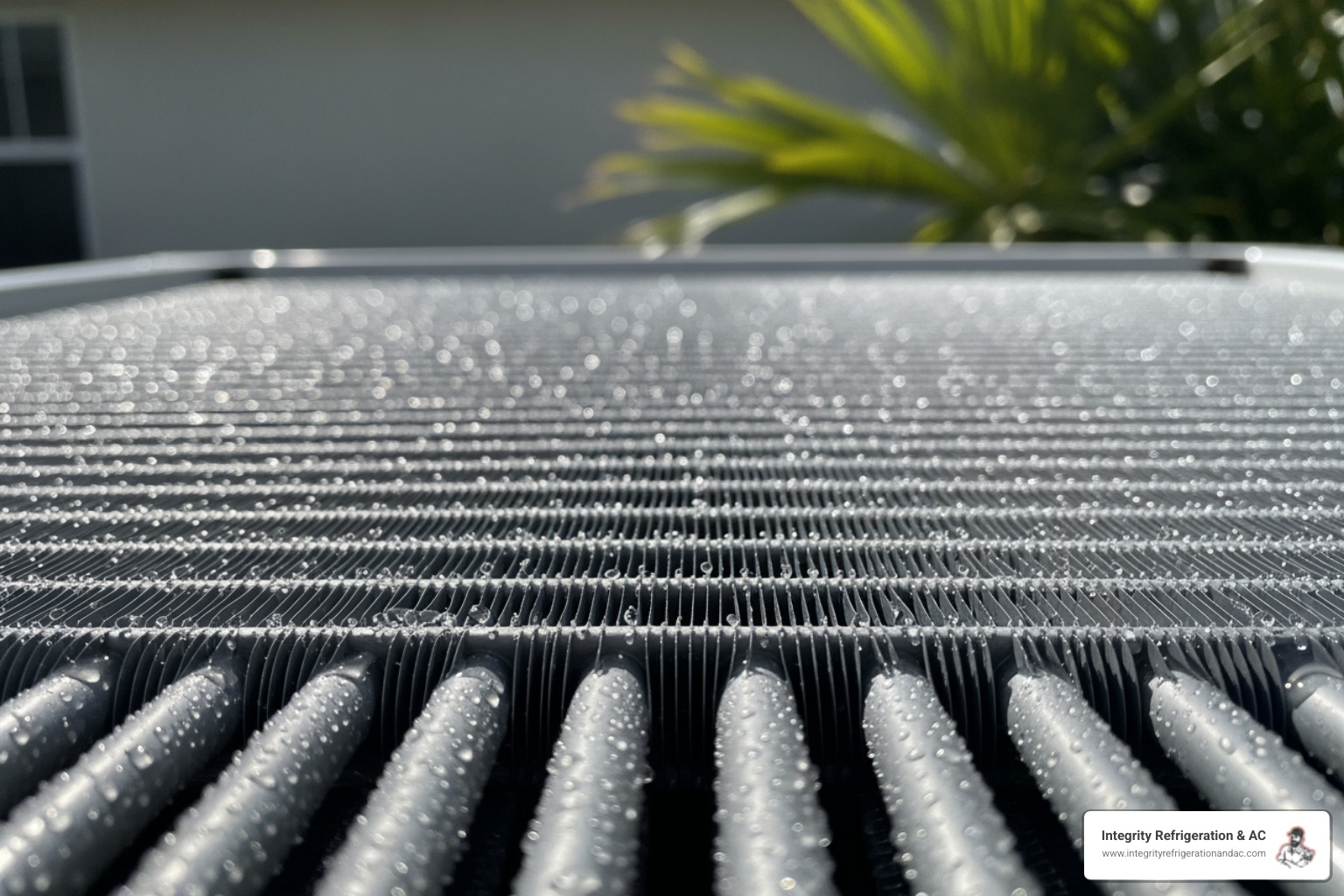
What Are AC Coils and Why Do They Need Cleaning?
AC coil cleaning is essential for keeping your air conditioner running efficiently and your energy bills low. At the heart of your AC system are two sets of coils that work together in a continuous cycle of heat exchange to cool your home.
- Evaporator Coils: Located inside your home's air handler, these coils absorb heat and moisture from your indoor air as it passes over them. This process cools and dehumidifies the air before it's circulated back into your rooms.
- Condenser Coils: Housed in your outdoor unit, these coils release the absorbed heat into the outside air. This allows the refrigerant to cool down and repeat the cycle.
Quick AC Coil Cleaning Overview:
- What: Removing dirt, dust, and debris from evaporator and condenser coils.
- Why: Dirty coils reduce efficiency by up to 30% and increase energy costs.
- When: At least once per year, more often in dusty Florida environments.
- Tools: Coil cleaner, soft brush, garden hose, protective gear.
- Safety: Always turn off power at the breaker before cleaning.
Over time, these coils collect dirt, pollen, pet hair, and other debris. This buildup acts like an insulating blanket, severely hindering the coils' ability to transfer heat. When this happens, your AC has to work much harder and run longer to cool your home.
Dirty coils cause several problems:
- Reduced Cooling Capacity: Dirt physically blocks airflow between the coil fins, meaning less cool air circulates in your home.
- Higher Electricity Bills: Impeded heat transfer forces the system to run longer, increasing energy consumption. Dirty coils can reduce efficiency by up to 30%.
- Increased Wear and Tear: The added strain on your AC's compressor can lead to premature system failure and costly repairs.
- Poor Indoor Air Quality: Dirty coils can harbor mold, bacteria, and allergens, which are then circulated throughout your home.
- Frozen Evaporator Coils: Severe airflow restriction can cause the evaporator coil to freeze, leading to further damage.
Both indoor and outdoor coils need regular cleaning to maintain peak performance, especially in Florida's dusty, humid climate where systems work year-round.
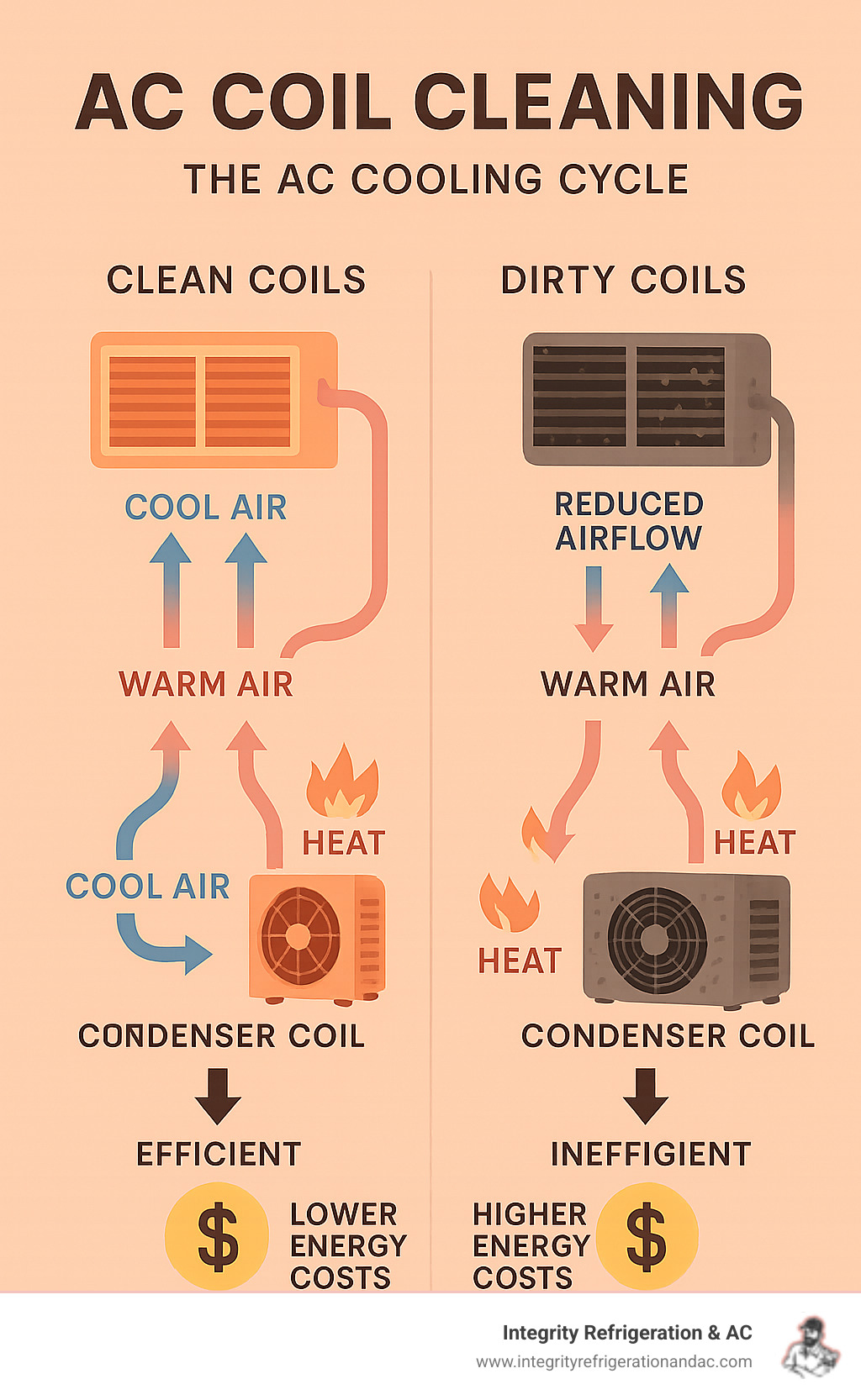
In short, AC coil cleaning is about maintaining efficiency, saving money, extending the life of your equipment, and breathing cleaner air.
Choosing the Right Cleaner for Your AC Unit
With an understanding of why AC coil cleaning is so important, the next step is selecting the right cleaner. There are several types available, each suited for different needs.
Foaming cleaners are a popular choice. When sprayed, they expand into a thick foam that penetrates deep between the coil fins, lifting out stubborn dirt. Many are self-rinsing, meaning the AC's natural condensation will wash the cleaner away over time. This is ideal for indoor evaporator coils where rinsing with a hose is not an option.
Non-foaming cleaners are typically liquid concentrates diluted with water. While often gentler, they require a thorough rinse with water, making them more suitable for outdoor condenser coils.
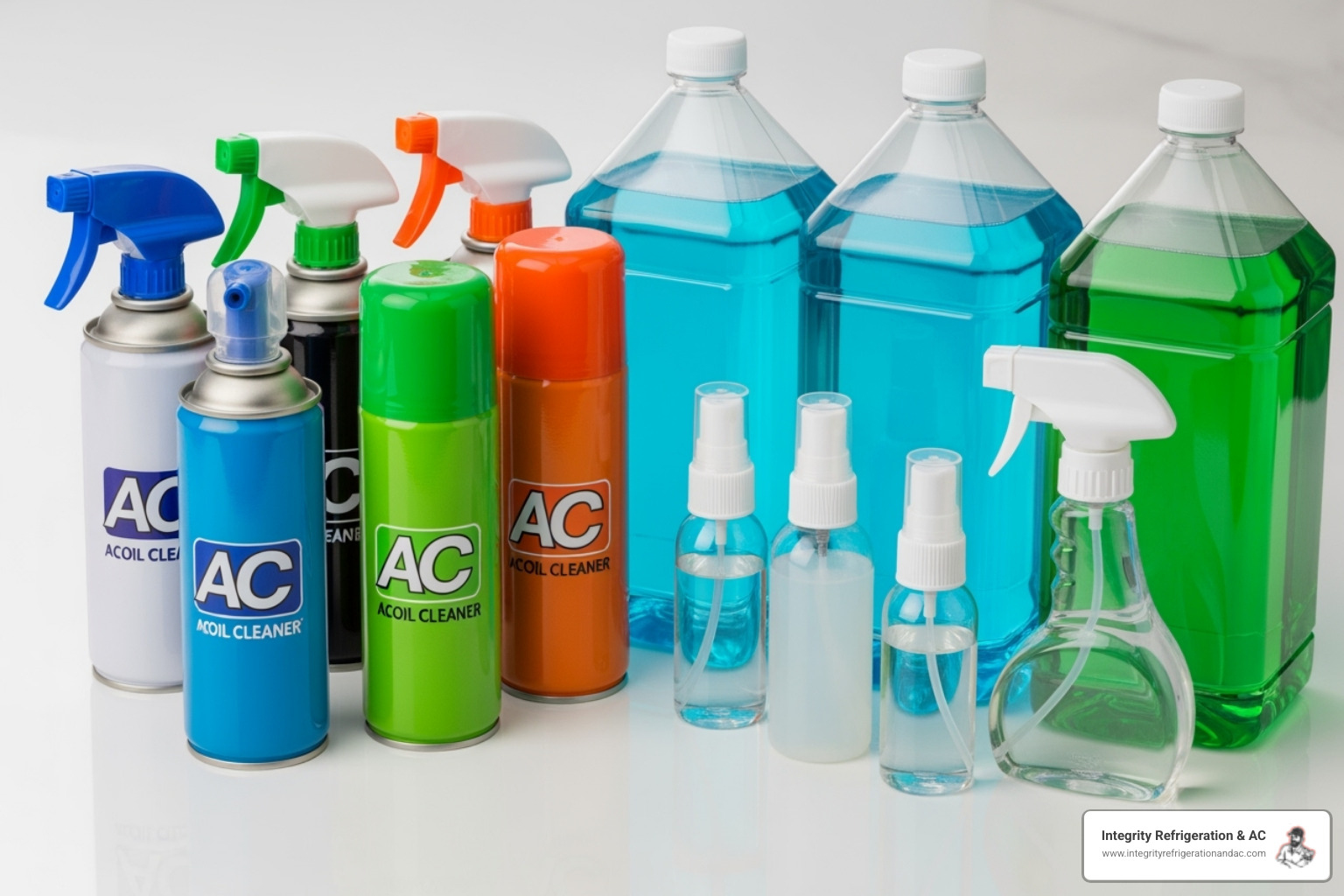
Cleaners also come in different packaging. Aerosol cans are ready-to-use and convenient for most DIY projects. Liquid concentrates are more economical for cleaning multiple units or for regular maintenance.
When selecting a cleaner, look for these key features:
- Biodegradable: An environmentally friendly option that won't harm your garden.
- Non-corrosive: Essential for protecting the delicate aluminum fins and copper tubing from damage.
- Self-rinsing (or No-rinse): A must-have for indoor evaporator coils to avoid a messy cleanup.
| Feature | Foaming Coil Cleaners | Non-Foaming Coil Cleaners |
|---|---|---|
| Application | Expands into a thick foam, clings to surfaces. | Liquid, often diluted, applied as a spray. |
| Dwell Time | Longer dwell time, foam helps lift stubborn dirt. | Shorter dwell time, may require more scrubbing. |
| Penetration | Excellent for penetrating deep into coil fins. | Good, but might require more direct application. |
| Rinsing | Often "no-rinse" (for evaporator coils), or requires light rinse. | Typically requires thorough rinsing with water. |
| Visibility | Easy to see where applied due to foam. | Can be harder to see full coverage. |
| Mess Factor | Can create foam overflow if not managed indoors. | Less messy if applied carefully, but requires rinsing. |
| Stubborn Dirt | Generally very effective on heavy buildup. | Effective, but might need more applications or scrubbing. |
For most homeowners, a quality foaming aerosol cleaner is a great starting point. It's effective, easy to apply, and often suitable for both indoor and outdoor coils. Using a product designed specifically for AC coils makes the process smoother and protects your investment.
The Step-by-Step Guide to AC Coil Cleaning
While AC coil cleaning might seem intimidating, it's a manageable DIY project with the right approach. This guide will walk you through the process for both your outdoor and indoor units.
Safety First: Essential Precautions
Before starting, take these critical safety steps:
- Power Off Completely: Turn your AC system to "off" at the thermostat. Then, find the circuit breaker for your AC unit in your electrical panel and flip it to the "off" position.
- Use the Disconnect Switch: For your outdoor unit, locate the nearby disconnect box (a small panel or switch) and turn it off as well.
- Wear Protective Gear: Use goggles to protect your eyes from debris and chemical splashes, and wear gloves to protect your hands from sharp coil fins.
- Ensure Proper Ventilation: When cleaning indoor coils, open windows to allow fresh air to circulate, especially when using cleaning chemicals.
How to Clean Your Outdoor Condenser Coils
Your outdoor unit is exposed to the elements and collects leaves, grass, and dust. Follow these steps to clean it:
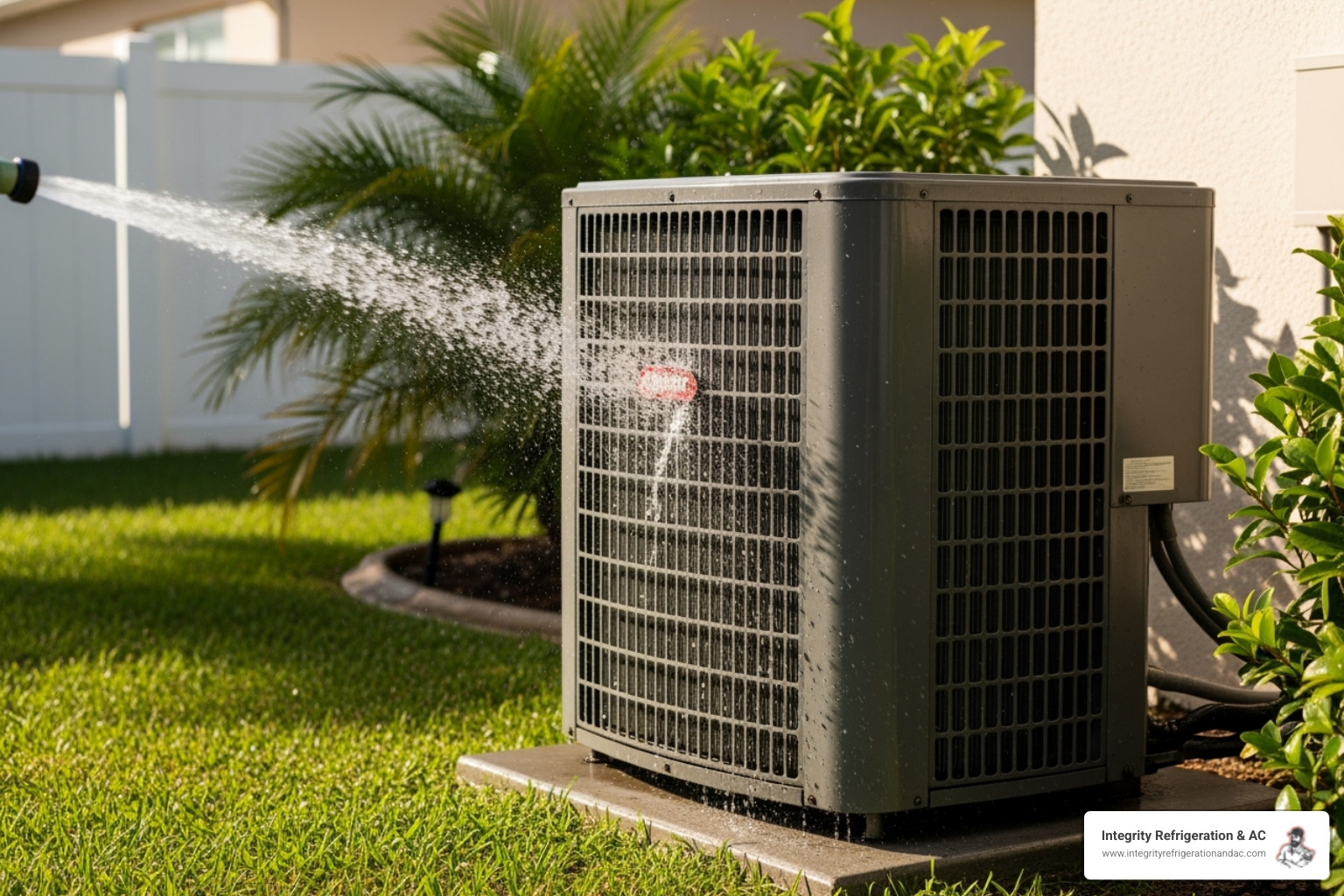
- Clear Debris: Remove leaves, grass, and weeds from around the unit. Trim back any bushes or plants to create at least two feet of clearance for proper airflow.
- Remove Outer Cover: If possible, remove the protective grille or fan assembly by unscrewing it. Be gentle with any attached wiring.
- Clean Loose Grime: Use a soft brush or a shop vacuum to gently remove loose dirt from the fins. You can also use compressed air, blowing from the inside out.
- Gentle Water Rinse: Using a garden hose (not a pressure washer), gently spray the coils. Aim from the inside out if accessible, or spray downwards from the outside.
- Apply Cleaner: Generously apply your chosen coil cleaner, ensuring even coverage. Let it sit for the time recommended on the product label (usually 5-10 minutes).
- Rinse Thoroughly: Rinse the coils completely until the water runs clear, washing away all foam and grime. Again, spray from the inside out when possible.
- Straighten Bent Fins: If you notice bent fins, use an inexpensive fin comb to gently straighten them. This improves airflow and efficiency.
How to Clean Your Indoor Evaporator Coils
Indoor coils are more delicate and require a careful approach.
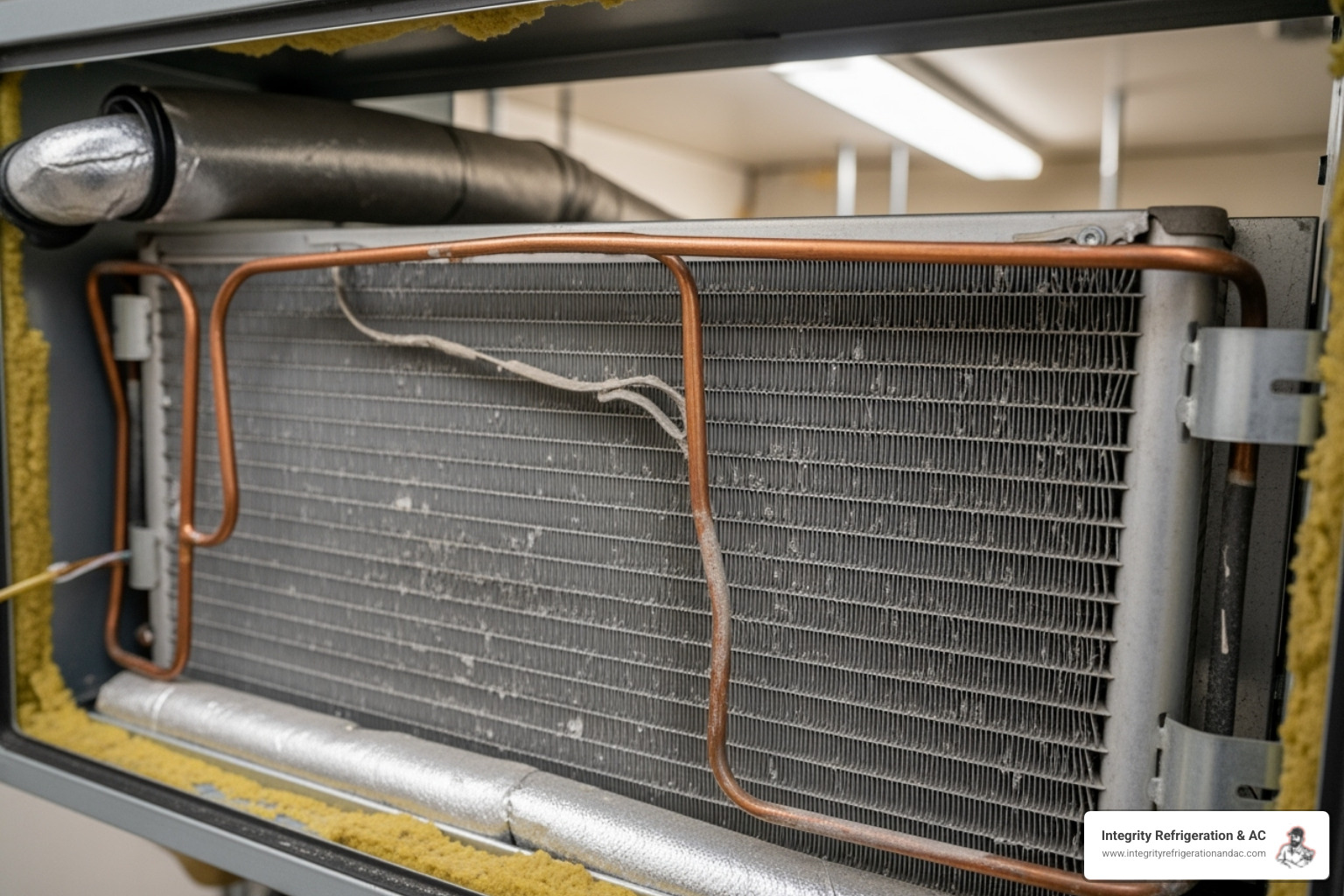
- Access the Coil: Locate and remove the access panel on your indoor air handler or furnace. Consult your owner's manual if you're unsure where it is.
- Inspect the Drain Pan: Check the drain pan located beneath the coils. Clean out any gunk or standing water. Pouring a cup of white vinegar down the drain line can help prevent future clogs.
- Remove Loose Debris: Gently use a soft brush or a vacuum with a brush attachment to remove dust from the delicate fins.
- Use a No-Rinse Cleaner: For indoor coils, a no-rinse foaming cleaner is the best choice. Apply it evenly across the entire coil surface. These cleaners are designed to be carried away by the natural condensation your AC produces.
- Protect Surrounding Components: Place towels or a pan below the coil to catch any drips and protect electrical parts and insulation.
- Reassemble and Dry: Once the cleaner is applied, reattach the access panel. Allow the unit to air dry for several hours before restoring power and turning the system back on.
Benefits and Best Practices for Coil Maintenance
After cleaning your AC coils, you'll enjoy significant improvements in comfort, cost, and system health. Regular AC coil cleaning is one of the most effective maintenance tasks you can perform.
The Importance of Regular AC Coil Cleaning
Removing the insulating layer of grime from your coils provides immediate and impressive results:
- Improved Efficiency: Clean coils transfer heat effectively, allowing your AC to cool your home faster and more efficiently.
- Lower Energy Bills: By restoring efficiency (which can be reduced by up to 30% when coils are dirty), you'll see a noticeable drop in your monthly electricity costs.
- Extended Unit Lifespan: A clean system puts less strain on the compressor, the heart of your AC. This reduces wear and tear and can add years to your unit's life.
- Better Indoor Air Quality: Cleaning removes mold, bacteria, and allergens that can accumulate on coils, leading to healthier air for your family.
- Fewer Breakdowns: Reduced strain on components means a lower likelihood of unexpected and costly repairs.
How Often Should You Clean Your Coils?
For Florida's climate, annual cleaning is the minimum recommendation, ideally performed each spring before summer arrives.
However, you may need more frequent cleaning if you have:
- High-Pollen or Dusty Environments: Proximity to construction or heavy foliage may require cleaning twice a year.
- Pets: Pet hair and dander can clog coils quickly, so a check every six months is a good idea.
Watch for these signs that your coils need cleaning:
- Reduced airflow from vents
- AC runs constantly but doesn't cool effectively
- Unexplained increases in your energy bill
- Visible dirt or mold on the coils
- Musty odors from your vents
- Ice formation on the indoor evaporator coil (a serious sign requiring immediate attention)
Regularly inspecting your coils can help you catch problems early. For a comprehensive maintenance plan custom to your home, professional service is a great option. More info about professional AC maintenance.
Frequently Asked Questions about AC Coil Care
Here are answers to some common questions about AC coil cleaning.
Can I just use water to clean my AC coils?
While a gentle water rinse can remove loose debris from outdoor coils, it's not enough for a deep clean. Water alone cannot break down the sticky, baked-on grime that reduces efficiency. For a thorough AC coil cleaning, you need a specialized cleaner formulated to dissolve this buildup without damaging the coils. For indoor coils, using only water is messy and ineffective.
What happens if I damage the coil fins while cleaning?
It's common to accidentally bend some of the delicate aluminum fins. Bent fins restrict airflow, forcing your system to work harder and reducing efficiency. Luckily, minor damage is easy to fix. You can purchase an inexpensive fin comb at a hardware store. Gently use the tool to straighten the fins. If the damage is extensive or you're not comfortable doing it yourself, it's best to call a professional.
Is professional AC coil cleaning better than DIY?
The best approach depends on the situation. DIY cleaning is great for routine annual maintenance if you are comfortable with the process and safety precautions. It can save you money and is effective for light to moderate buildup.
Professional cleaning is the better choice for:
- Heavy Buildup: If coils haven't been cleaned in years, professionals have commercial-grade cleaners and tools for the job.
- Complex Issues: Professionals can safely access tricky indoor coils, spot other potential problems like leaks or electrical issues, and properly handle mold or algae growth.
- Peace of Mind: A professional service ensures the job is done correctly and includes a full system inspection.
For light maintenance, DIY is a good option. For deep cleaning, diagnosing problems, or comprehensive service, professional help is recommended.
Conclusion: When to Call the Professionals
Regular AC coil cleaning is a powerful way to ensure a cooler home, lower energy bills, and a longer-lasting AC unit. For routine cleaning of accessible outdoor coils, a DIY approach can be very rewarding and effective.
However, it's important to know when a situation calls for professional expertise. Consider calling a professional if you encounter:
- Years of heavy, stubborn buildup.
- Difficulty accessing indoor evaporator coils.
- The presence of mold or algae.
- Discomfort working around electrical components.
Making a smart decision for your home's HVAC system is key. Here at Integrity Refrigeration & AC, we help families throughout Winter Haven, Davenport, Lakeland, Auburndale, and the surrounding Polk County area keep their homes comfortable. We believe quality service should be affordable, which is why we offer flexible financing options to make professional AC coil cleaning and maintenance accessible to everyone.
Our service goes beyond just cleaning. We perform a thorough inspection to identify potential issues before they become expensive problems. Whether you choose to DIY or call our trusted team, prioritizing this crucial maintenance task is what matters most. Your AC system works hard in the Florida heat and deserves the care it needs to perform its best.
Don't let dirty coils compromise your comfort. Your home should be a cool sanctuary, and clean coils are a big part of making that happen.
Schedule your professional AC service today. We're here to help you achieve sparkling coils and a truly cooler home!


